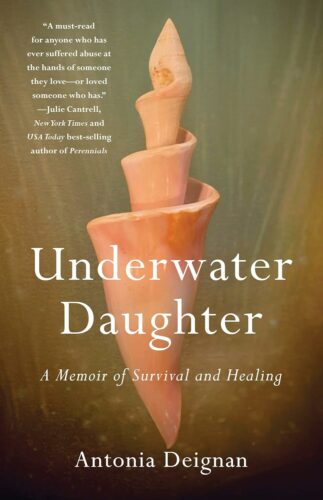 A Lyrical Memoir of Abuse
A Lyrical Memoir of Abuse
Author: Antonia Deignan
As a child, Tuni didn’t know that her father was sexually abusing her. She thought it was love. A special bond, a secret kind of affection. The fact that her mother knew and was present only galvanized this normalcy, or so she thought. But as an adult, she reflects on the abuse in Underwater Daughter, on the way its wrongness colored her entire life, from the gradual realizations growing up, to the body dysmorphia and solace sought in alcohol and drugs, and finally to her own approach to motherhood and finally caring for her elderly, dying parents.
“I’m sorry,” she never said to me. And out loud in return I never said, “I forgive you.” But I did. I forgave her. Fuck. I never told her. Fuck. She never said it.
Underwater Daughter is a strange collection, an out-of-sequence, fragmented memoir that is part poetry and part essay. Author Antonia Deignan shares feelings more than moments, choosing to play with time, to follow her own consciousness, to at times create the closeted feeling of repression and at other times explore an explosive, uncontrollable sensuality that colors her normal world from childhood onward. It’s an uncomfortable memoir, and while it is rarely explicit, drawing the curtain to cover the worst deeds in a few sparse sentences that are more poetry and emotion than description, it’s nonetheless disturbing. And it’s real because there are no answers. The father and mother remain in Tuni’s life, and despite various attempts to seek truth from them, or at least an acknowledgement of what happened and its very perversion, Tuni is left to sort out and make excuses for two selfish people. We see her, in the end, a parent to her own parents, nurturing and caring for them, and yet caught, wondering why, giving forgiveness where perhaps it has never been earned, and finding consolation in accepting the drowning depths of human complexity and betrayal.
The subject matter is brutal, but important, and Tuni is a strong figure who fights through her pain and leaves something exquisite in its wake. Yet, many times the narrative is distancing. Sometimes, the lyricism shields the emotions a little too well, taking them away from our senses and making them more conceptual. Coping mechanism – definitely – and a good one at that, but it can fracture the narrative. The time jumps,

Image by Sarah Richter from Pixabay
the moments where Tuni’s honesty stops and she leaves major events in her own life undisclosed (like shutting down her dancing studio, all in one sentence), makes us still feel that only parts of this story are shared and more remains heavily veiled. The creature in the shell peeks an eye out, even a feeler now and again, but this underwater entity retains its depths. That’s a beautiful and valid way to write a story, true, but it just didn’t resonate with me as truly as some other memoirs. I felt distanced, seeing a story scrubbed through the shifting depths of ocean, a hint of wavering outline at the bottom, a monster lurking on the edge that I am terrified to truly see, something soul crushing and wild all thrown into the mix. The ocean is a good evocation of what is going on here, of the complexity, but at times, I wanted to rip aside the poetry and just sit with Tuni, get to know her and her full life’s story, unvarnished, not cloaked in beauty.
I also wanted what, of course, life never gives. Answers and justice. This memoir is haunting, in that Tuni gets neither. She comes through the other side, the good person to the end, having shouldered these horrific burdens her entire life and laid both of her parents to rest. Both had good lives. Never answered for their crimes, and Tuni is left to wonder. Were they victims too, in a way? Did something happen to them in their youth, making them perpetuate the cycle? How do you find mercy and love for parents who do such a thing, and yet, how do you let go of parents, no matter what?
While I felt the telling was a bit vague, the story splintered and hidden at times, truths withheld or hinted at, this is still a powerful memoir. It’s hard to write a review of someone’s story, especially when they are brave enough to come forward with that story, to share any part of it with others. Well done. Moving. Heart-breaking. Tuni’s pain resonates, even in the depths of her beautiful soul, in her ultimate overcoming, in her ability to raise children and show them the real, un-perverted love that was denied to her as a child.
– Frances Carden
Follow my reviews on Twitter at: https://twitter.com/xombie_mistress
Follow my reviews on Facebook at: https://www.facebook.com/FrancesReviews
- Book Vs Movie: The Shining - April 6, 2020
- Thankful For Great Cozy Mysteries - December 13, 2019
- Cozy Mysteries for a Perfect Fall - October 20, 2019


